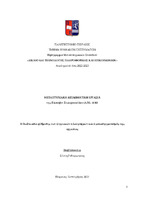Η διαδικασία ρύθμισης των ψηφιακών πλατφορμών και ο μετασχηματισμός της εργασίας

View/
Keywords
Πρόταση Οδηγίας 2021/0414 ; Ψηφιακές πλατφόρμες εργασίας ; Εργατικό δίκαιο ; Ψηφιακός μετασχηματισμός ; ΕργασίαAbstract
Modern societies are experiencing the period known as the "Fourth Industrial Revolution" and the "Digital Age," with the rapid evolution of Information and Communication Technologies significantly impacting various aspects of global social, economic, and political life. One sector intricately connected to these changes is the field of labor, which appears to be undergoing a transformation as these technologies become integral to economic production. This Thesis attempts to analyze certain aspects of the transformation of labor in the present day, utilizing the example of work conducted through digital platforms. More specifically, it seeks to shed light on various facets of this relatively contemporary labor phenomenon, such as the description of employment through platforms, the implications for employers and workers, the existing legal framework, and the efforts to further regulate it as part of the broader modern challenges that labor law is called upon to address.
In relation to the structure of this Thesis, it begins with an Introduction concerning the integration of Information and Communication Technologies into the labor sector, with the resulting transformation necessitating changes in labor legislation. Subsequently, in the First Chapter, an attempt will be made to provide a comprehensive understanding of what digital labor platforms are, their categorization, and how they operate. In the Second Chapter, the impacts of utilizing these platforms on employers and, correspondingly, on workers will be presented. The Third Chapter discusses the need for regulating the employment framework through digital platforms, highlighting the challenges posed by the existing legal void in these relations. It starts with a comprehensive overview of the transformation of labor law to date and also briefly reviews how jurisprudence has developed in a European context in an effort to adapt the existing legal rules to the new labor dynamics. The Fourth Chapter briefly presents the efforts to regulate the subject of labor at the European Union level, with the relatively recent example of the EU Directive on workers in digital platforms. It also offers a critical analysis of this approach. Finally, a Conclusion will follow regarding the developments related to the transformation of labor in the Digital Age, using the example of labor provided through digital platforms and the regulatory process.


